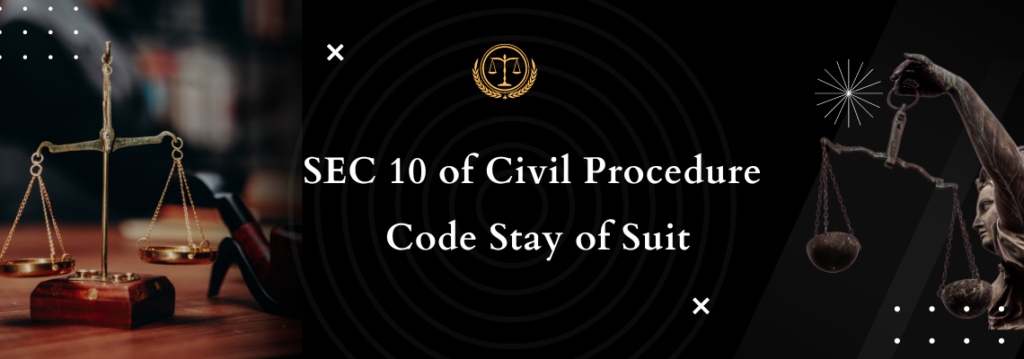No Court shall proceed with the trial of any suit in which the matter in issue is also directly and substantially in issue in a previously instituted suit between the same parties, or between parties under whom they or any of them claim litigating under the same title where such suit is pending in the same or any other Court in [India] having jurisdiction to grant the relief claimed, or in any Court beyond the limits of [India] established or continued by the [Central Government] [**] and having like jurisdiction, or before [the Supreme Court].
The provisions of s. 10 are mandatory and normally, the application under s. 10 is to be decided after the filing of the written statement by the defendant. However, the court can entertain and decide the application even before the filing of the written statement. Further, there is nothing in this section to show or suggest that if an issue of jurisdiction has been raised in a previously instituted suit, the defendant cannot invoke the provisions of s. 10 in a subsequent suit unless he withdraws or waives that objection.
Rule of Res Sub Judice
We have commonly dealt with Doctrine of res judicata but what has been less discussed in this rule of res sub judice which finds space under section 10 of code of civil procedure.
The rule of res sub judice applies to the trial of a suit and not to its institution. It is only the trial of the suit that is not to be proceeded with. The section 10 of code of civil procedure enacts merely a rule of procedure and a decree passed in contravention of it is not a nullity and cannot be disregarded in execution proceedings.
Some of the Scenarios Wherein Section 10 of Code of Civil Procedure Was Dealt with are
In a civil suit seeking declaration of title, the defendant’s case was based on Will but the plaintiff had made allegations that the Will was forged and fabricated and in that regard criminal proceedings were pending. It was held that the proceedings in the suit deserve to be stayed.
In a civil suit and criminal case on the same facts, where stay of civil suit was sought on the ground of disclosing the defence, it was held that though the defence has been disclosed as written statement had already been filed, it was held that directions should be given to the Criminal Court to dispose of the criminal case within 3 months and Civil Court be directed to post pone the trial of the suit till then.
The object of the rule of res sub judice contained in this section is to prevent courts of concurrent jurisdiction from simultaneously entertaining and adjudicating upon parallel litigations filed for the same cause of action, for the same subject-matter and for the same relief between the same parties and to avoid recording of conflicting findings on issues which are directly and substantially in issue in two suits.
Section 10 applies only to suits and appeals. Since an appeal is a continuation of suit and does not apply if the earlier proceeding is not a suit the provision of s. 10 do not apply to a subsequently instituted suit under O. 37 up to the stage of grant of leave, as trial in summary suit begins only after the grant of leave to defend nor to an application to sue as an indigent person nor to execution arbitration or marriage proceedings.

Under S. 10 CPC, A Suit May be Stayed on Fulfilment of the Following Conditions
There are two suits one previously instituted and the other subsequently instituted.
The matter in issue in the subsequent suit is directly and substantially in issue in the previous suit.
The parties to both the suits are the same.
The previously instituted suit must be pending.
The court in which the previous suit is pending has jurisdiction to grant the relief claimed in the subsequent suit.
Both the parties are litigating under the same title in both the suit.

